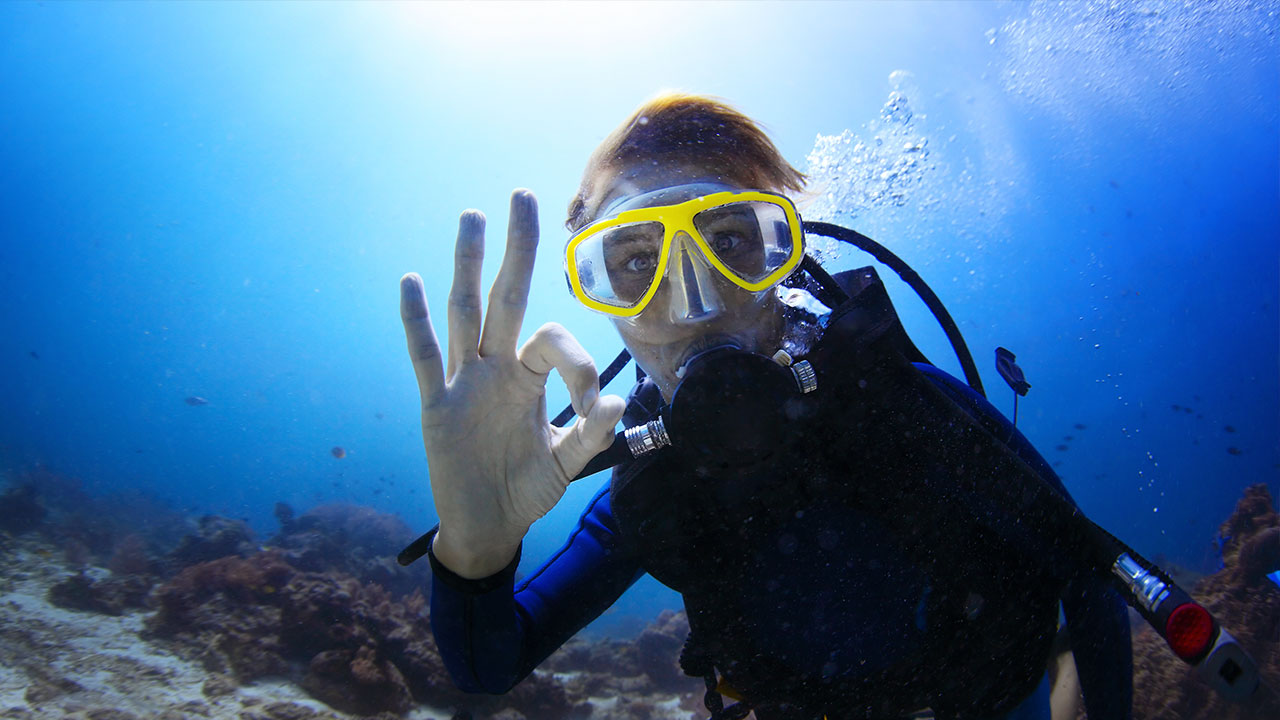Tips for Divers to Deal With Motion Sickness

Statistics show that roughly 1 in 3 people suffer from motion sickness or seasickness, and those of us who do, know that nothing ruins a dive trip like feeling poorly when on a boat. Constant nausea and vomiting on your way to the dive site and/or during the surface intervals can hinder your future dives. Fortunately, you don't have to let your dodgy inner ear destroy your plans. In this article, we’ll explain what causes motion sickness, and list some of the best and easiest ways of dealing with it.
What Causes Motion Sickness?
In simple terms, motion sickness occurs when the inner ear, the eyes, and other areas of the body that detect motion send conflicting messages to the brain. One part of your balance-sensing system may indicate that your body is moving, while the other parts do not sense motion.
When you are in the cabin of a moving ship, your inner ear may sense the motion of big waves, but your eyes don't see any movement. This can make the body and brain, feel extremely unsettled and trigger motion sickness. Your brain will often think you've been poisoned when it detects this strange movement that doesn't relate to what you're seeing - and then you throw up to rid yourself of the imaginary poison.
Other symptoms of motion sickness include:
- Yawning
- Stomach pain or discomfort
- Nausea
- Dry-heaving
- Dizziness
- Slight sweating
- Excessive salivating
- Passing wind or belching
- Difficulty when concentrating
When the symptoms of motion sickness begin, they usually won’t stop until you have your feet firmly on land. For some, however, the unpleasant sensations can last up until the next day.
Dealing With Motion Sickness
Below we will describe a few easy and effective ways to prevent motion sickness and deal with the symptoms if they occur. Remember that we are all different and what works for some may not automatically work for you. You may need to try out a few different methods before discovering the one that will be best for you.
Before
1. Make sure you get plenty of rest. Having a good night’s sleep is always important before going out on a dive, and even more so if you are prone to motion sickness. Exhaustion can make you more susceptible to motion sickness and worthen the symptoms.
2. Stay away from alcohol. Avoid drinking the night before you are set to go out on a dive boat. Consuming alcohol, especially in large amounts, can prevent the REM (rapid eye movement) stage of sleep, which is the one where your brain fully rests and you begin to dream. When waking up after this, you may feel foggy, unable to concentrate and hungover, which will leave you more susceptible to the symptoms of motion sickness. If you do go out for a night out before diving the next morning, use the 1:1 rule - for every glass of alcohol you consume, the next glass you drink should be water. This will help you to remain hydrated and fully functional the next day.
3. Avoid foods and liquids that “don’t agree with you”. You should also avoid eating overly greasy or acidic foods and drinking coffee or caffeinated drinks. These will weigh heavy on your stomach and slow down your digestive process.
4. Don’t miss a meal before your dive. Not only will you need the energy for your day of diving, eating the right foods can help your stomach concentrate on something, other than wanting to remove its contents.
5. Prepare some natural remedies. There are a number of natural products that can help reduce the symptoms of motion sickness. You can prepare a few beforehand and try what works for you.
Ginger is the best-known natural antiemetic that helps to soothe the stomach, preventing nausea and vomiting. There are a variety of ways you can consume it. Steep fresh ginger in hot water to make tea, try candied ginger, ginger biscuits, slice up some fresh ginger root and put it in your bottle of water to take with you on the boat or buy ginger root pre-packaged in capsule form if you do not like the taste of it.
Licorice is also known to be effective in relieving stomach discomfort. You can either buy it in the form of licorice bark to chew on or as candy. Keep in mind, however, you should never consume excessive amounts of licorice, as it can cause diarrhea, abdominal pains and other side effects. People with high blood pressure or low potassium levels should avoid licorice altogether.
Peppermint, especially in the form of essential oil, is a safe and effective way to overcome nausea and vomiting. Try rubbing a couple of drops into the back of your neck, temples, and forehead. You can also buy the leaves and place them in your water bottle (together with ginger) to enjoy throughout the day.
6. When all else fails, medicate. If you experience severe motion sickness and find that the natural remedies and prevention methods don’t work for you, go ahead and take over-the-counter medications. Make sure that they are non-drowsy and don’t contradict other medications you may be taking. The best-known antiemetics used among divers are Dramamine, Bonine, and Meclizine. These are most effective 30 to 60 minutes prior to going on the boat. Remember, you should speak to your healthcare professional before trying any new medication.
During
1. Assemble your dive gear early. Once you are on the boat, set up your equipment immediately. If you can, do it before the boat has even left the dock. This will reduce the amount of time that you spend on the deck and will allow you to focus only on static objects when the boat moves.
2. Choose a seat where you will experience the least motion. The middle of the boat is usually the most stable part.
3. Avoid gasoline or petrol fumes. The smell of fuel can make nausea much worse, so stay away from the boat engines.
4. Avoid direct sunlight. If possible, find a cool shaded area on the boat, if not, wear protective clothing and stay hydrated.
5. Look at the horizon. Focusing on a distant static object can calm your brain and help keep your eyes in tune with the motion of the boat. Definitely, don't read or look down while you're moving.
6. Isolate yourself from others who may be suffering from motion sickness. If you see someone getting seasick on your boat, move away fast. Hearing others talk about motion sickness or seeing someone becoming ill can make you feel ill yourself.
7. If you can, try and sleep between the dives. Sleep will act to reset your inner ear and help you grow accustomed to the constant movement.
8. If nausea begins to creep up on you, simply tip your head to the side. This gives your brain a totally different perspective and can help to eliminate nausea, for a short time.
9. Grab your favorite fizzy drink. When your stomach is upset, the carbonation in soda can relieve gas build-up and dilute acids that cause queasiness. At the same time, the water and sugars replenish your body with vital liquids and nutrients.
10. Get someone to throw ice cold water over you. If you are really suffering from dizziness, vomiting, and nausea, this can be helpful, as it will shock your body, getting your systems to function properly again. Plus, this method is quite fun for the person throwing the water over you.
After
If unfortunately, you do suffer from motion sickness, make sure to always replenish the nutrients lost by the body when vomiting and sweating. You can take a sachet of electrolytes with you and pour it into your water to keep your strength up after throwing up.




